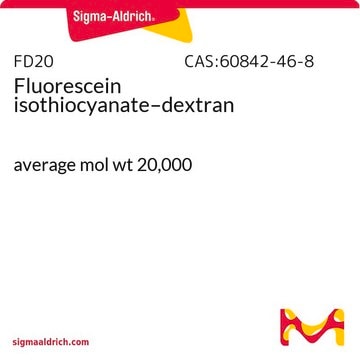FD40
Fluorescein isothiocyanate–dextran
average mol wt 40,000
Synonym(s):
FITC–Dextran
About This Item
Recommended Products
biological source
bacterial (Leuconostoc mesenteroides)
conjugate
FITC conjugate
form
powder
mol wt
average mol wt 40,000
extent of labeling
0.001-0.020 mol FITC per mol glucose
color
light yellow to dark orange
solubility
H2O: 25 mg/mL
storage temp.
2-8°C
Looking for similar products? Visit Product Comparison Guide
Related Categories
General description
Application
Preparation Note
Other Notes
Signal Word
Warning
Hazard Statements
Precautionary Statements
Hazard Classifications
Eye Irrit. 2 - Skin Irrit. 2 - STOT SE 3
Target Organs
Respiratory system
Storage Class Code
11 - Combustible Solids
WGK
WGK 3
Flash Point(F)
Not applicable
Flash Point(C)
Not applicable
Personal Protective Equipment
Certificates of Analysis (COA)
Search for Certificates of Analysis (COA) by entering the products Lot/Batch Number. Lot and Batch Numbers can be found on a product’s label following the words ‘Lot’ or ‘Batch’.
Already Own This Product?
Find documentation for the products that you have recently purchased in the Document Library.
Customers Also Viewed
Our team of scientists has experience in all areas of research including Life Science, Material Science, Chemical Synthesis, Chromatography, Analytical and many others.
Contact Technical Service










